Share
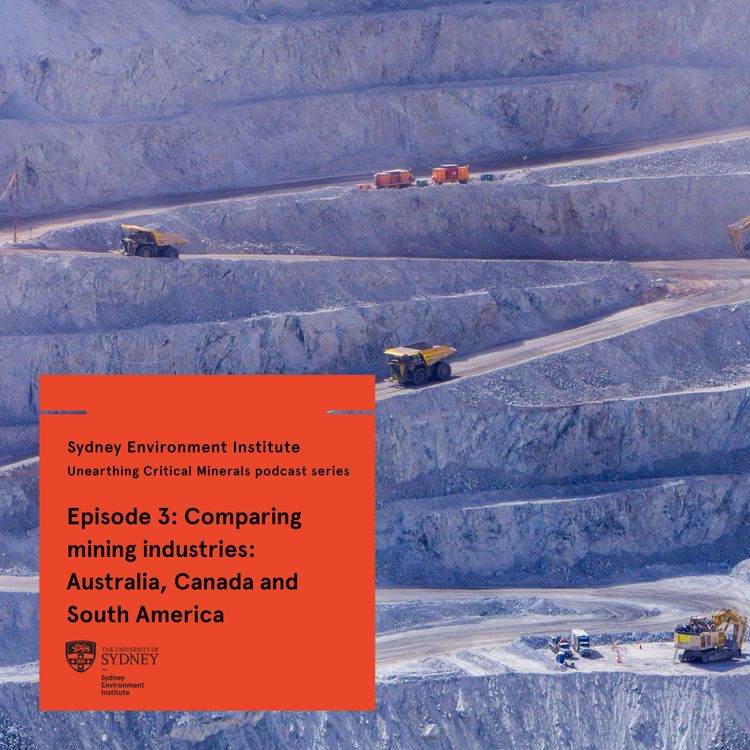
The SEI Podcast Series
Episode 3: Comparing mining industries: Australia, Canada and South America
In this episode, Professor Susan Parks sits down with political scientist Dr Donald Kingsbury as they delve into the contrasting experiences of mining communities in Canada, Australia, and South America. Explore the influences of mining company dynasties, extractive processes, and citizen engagement. Uncover how governments are actively de-risking the critical minerals industry and incentivising private investment. They’ll discuss how the mining industry is reducing harm thanks to pressure from labour organisations and environmental activism and where there are still areas for improvement.
Learn more about the Unearthing Critical Minerals podcast series and read the show notes here.
Credits:
Featuring: Professor Susan Park, Assistant Professor Donald Kingsbury
Produced by: Genevieve Wright
Edited by: Celine Huynh
More episodes
View all episodes
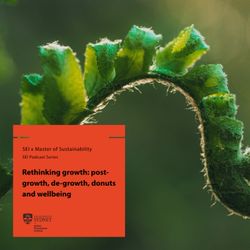
Rethinking growth: Post-growth, de-growth, donuts and well-being
56:52|Unpack the growth paradigm and hear from thinkers reimagining economies built around well-being, climate justice, and living within planetary boundaries. This event is part of SEI’s Climate Justice Series. This panel series brings together leading thinkers and practitioners to explore the urgent intersections of climate action, equity, and systemic change.Timestamps:00:50 - Welcome and acknowledgement of Country04:32 – Mengyu Li 14:44 – Julia Steinberger20:16 – Manfred Lenzen24:32 – Annette Cowie32:39 - Sharon Friel40:50 - What is the one benefit you wish people understood about post-growth?45:50 - Q+A beginsSpeakers:Chair: Zoe WhittonMengyu Li, University of Sydney Julia Steinberger, University of LausanneManfred Lenzen, University of SydneyAnnette Cowie, NSW Department of Planning and EnvironmentSharon Friel, Australia National University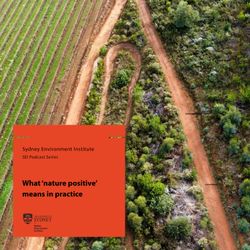
What ‘nature positive’ means in practice
52:34|‘Nature positive’ is everywhere but what does it really mean? In this instalment, hear expert insights on its use in policy, conservation, and finance, and who stands to benefit. This event is part of SEI’s Climate Justice Series. This panel series brings together leading thinkers and practitioners to explore the urgent intersections of climate action, equity, and systemic change.Timestamps:00:50 - Welcome and acknowledgement of Country06:01 – Dwayne Mallard on dignity having currency and value10:34 – Hugh Possingham on the difficulty of measuring nature17:57 – Chloe Fisher on private sector investment in nature23:05 – Jody Gunn on what principles should guide conservation and the finance sector32:00 - Thoughts on 'perfection is the enemy of the good'41:20 - Q+A beginsSpeakers:Chair: Carolyn HoggDwayne Mallard, ArjawayChloe Fisher, sustainability reporting expertHugh Possingham, former QLD Chief ScientistJody Gunn, conservation scientist and leader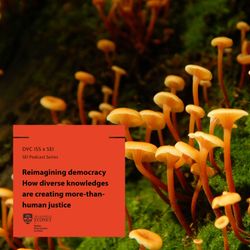
Reimagining democracy: how diverse knowledges are creating more-than-human justice
01:00:47|In this instalment of the SEI Podcast Series hear from leading environmental figures to explore models of more-than-human governance, drawing from Indigenous knowledges, creative and legal practices, and innovative research. This event is part of SEI’s Climate Justice Series. This panel series brings together leading thinkers and practitioners to explore the urgent intersections of climate action, equity, and systemic change.Timestamps:00:50 - Welcome and introduction07:30 – Patricia Gualingua on the Kawsak Sacha (Living Forest Declaration), translated by Silvia R. Martínez15:219 – Nardi Simpson on music, land and language22:53 – Paul Powlesland on the responsibility and possibility for transforming institutions32:20 – Shrishtee Bajpai on decolonisation and land rights in connection with more-than-human justice40:40 - What makes it possible for you to keep on imagining and embedding these possibilities in the present?46:38 - Q+A beginsSpeakers:Chair: Danielle Celermajer, Sydney Environment InstituteShrishtee Bajpai, Global Tapestry of AlternativesPatricia Gualinga, Sarayaku Indigenous rights advocateNardi Simpson, Yuwaalaraay storyteller, performerPaul Powlesland, Lawyers for NatureSilvia R. Martínez, Certified Conference Translator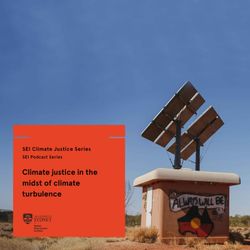
Climate justice in the midst of climate turbulence
51:59|In this instalment of the SEI Podcast Series, hear from leading voices as they discuss Australia’s urgent climate, housing and energy challenges, exploring solutions through inclusive decision-making, First Nations leadership, and innovative design to drive sustainable, equitable change for all.This event is part of SEI’s Climate Justice Series. This panel series brings together leading thinkers and practitioners to explore the urgent intersections of climate action, equity, and systemic change.Timestamps:00:50 - Welcome and introduction08:25 - Emma Bacon on how extreme heat is impacting society’s most vulnerable12:20 - Karra Kinchela on how fossil fuel extraction is effecting First Nations people17:30 - Amanda Tattersall on what does meaningful community engagement look like23:05 - Steve Hartley on how the planning system is managing a housing crisis and climate resilience31:00 - What climate justice issue should be prioritised on the federal government agenda? 39:40 - Q+A beginsSpeakersDavid Schlosberg, Director, Sydney Environment InstituteEmma Bacon, Executive Director, Sweltering CitiesSteve Hartley, Executive Director, Department of Planning, Housing & InfrastructureKarra Kinchela, Narrabri Community Coordinator, Lock the Gate AllianceAmanda Tattersall, Associate Professor of Practice in Urban Geography, University of Sydney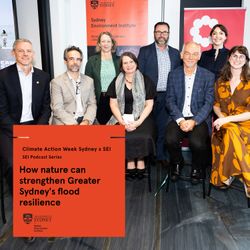
How nature can strengthen Greater Sydney's flood resilience
01:22:47|In this instalment of the SEI Podcast Series, discover how nature-based solutions can be integrated into urban and coastal planning to build resilience and improve ecological health whilst balancing competing demands for land use. Learn from successful projects, understand the challenges, and explore practical strategies to implement these solutions at scale. This event will be an exclusive preview of a new report that engaged with diverse stakeholders to understand how green and blue infrastructure can transform flood risk management in Greater Sydney.This event was held in partnership with the Sydney Environment Institute, Committee for Sydney, and AECOM at Climate Action Week 2025.Timestamps:00:50 - Welcome and introduction02:11 - Address by Beck Dawson and context of discussion 09:14 - Sam Kernaghan on Sydney's resilience during floods15:39 - Genevieve Wright on international examples of how nature is being used to stop flooding21:37 - Alice Simpson-Young on barriers for implementing nature-based solutions in Sydney 26:36 - How do we shift nature-based solutions to 'business as usual'?31:29 - Panel discussion begins31:52 - What are quick ways to embed nature-based solutions?35:36 - How can we integrate nature-based solutions and Disaster Adaptation Guidelines overview44:18 - The success of the GreenWay project53:07 - The Botany Wetlands system and tackling policy 1:05:11 - Q+A begins1:22:02 - ConclusionSpeakersSam Kernaghan, Director of Resilience Program at the Committee for SydneyNick Chapman, Resilience Specialist at Willoughby City CouncilBeck Dawson, Executive Director - Adaptation and Mitigation at the NSW Reconstruction Authority Dan Penny, Professor in the Faculty of Science at the University of SydneyAlice Simpson-Young, Principal Sustainability and Resilience Consultant at AECOMSarah Tasic, Assistant Director Disaster Risk Management at the NSW Reconstruction AuthorityGenevieve Wright, Senior Project Officer at the Sydney Environment Institute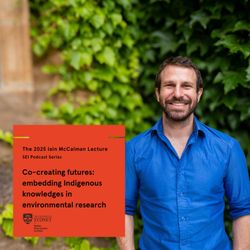
Co-creating futures: embedding Indigenous knowledges in environmental research
44:11|The 2025 Iain McCalman Lecture was delivered by Dr Mitch Gibbs as he reflected on his journey as an Indigenous researcher, exploring how collaboration with First Nations communities can transform environmental research. How can trust, collaboration, and co-designed strategies transform our relationship with the environment, fostering genuine Caring for Country in practice?Timestamps:00:50 - Welcome from Prof David Schlosberg02:48 - Mitch's early life growing up in Willawarrin, learning from the land05:19 - Mitch's journey through Western education, from Honours to PhD11:32 - Post-PhD and journey to incorporating Indigenous knowledge into academia12:55 - Current projects to include Indigenous knowledges26:54 - Fulbright Fellowship and work with Swinomish and Samish nations in North America36:19 - Towards the future37:50 - Prof Maria Byrne respondsSpeakers:Dr Mitch Gibbs, University of SydneyProfessor David Schlosberg, Sydney Environment InstituteProfessor Maria Byrne (respondent), School of Life and Environmental Sciences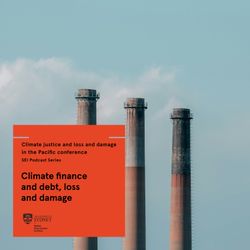
Climate finance and debt, loss and damage (Climate justice and loss and damage in the Pacific conference)
01:01:50|As climate change accelerates, Pacific Island nations face the twin challenges of increasing climate vulnerability and financial constraints that limit their ability to invest in resilience and recovery. This podcast will explore what a just and effective climate finance system could look like in the next decade and the structural barriers that must be overcome to achieve transformative change. This podcast was recorded as part of the Climate justice and loss and damage in the Pacific conference.Timestamps:00:51 - Introduction05:54 - Loss and damage debates need to engage with a dual debt crisis: the ecological debt owed by the Global North to the Global South and how this is entangled with broader questions of justice18:52 - The Pacific Resilience Facility (PRF) as the first Pacific-led, owned and managed regional resilience financing facility for community climate and disaster resilience31:29 - The dual challenge faced by many developing countries: unsustainable debt and increasing climate vulnerability42:50 - Q+ASpeakers:Associate Professor Kate Owens (Chair), Sydney Law School, University of SydneyFinau Soqo, Manager, Pacific Resilience FacilityMagalie Masamba, law and policy advisorDr Julia Dehm, La Trobe University
Civil society organisations and self-organising communities (Climate justice and loss and damage in the Pacific conference)
01:05:16|As climate change intensifies, Pacific Island communities are facing profound losses of land, livelihoods, cultural heritage, and ways of life. How can Pacific-led solutions shape just responses to loss and damage? This podcast was recorded as part of the Climate justice and loss and damage in the Pacific conference.Timestamps:00:50 - Introduction05:14 - Discussion of Pasifika Network Loss and Damage 12:53 - Building resilience and achieving climate justice in the Pacific26:20 - Exploring the gendered dimensions of rural Australian community disaster responses and resilience building, highlighting women’s experiences39:33 - Q+ASpeakers:Professor David Schlosberg (Chair), Sydney Environment Institute, University of SydneyVenaisi Uluilakeba, coordinator for the Pasifika Network Loss and DamageLavetanalagi (Lagi) Seru, climate justice activist Dr Rebecca McNaught, University Centre for Rural Health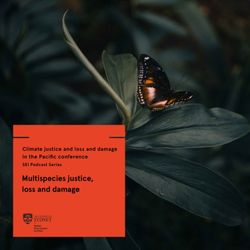
Multispecies justice, loss and damage (Climate justice and loss and damage in the Pacific conference)
01:02:18|As climate change intensifies, Pacific Island communities are facing profound losses of land, livelihoods, cultural heritage, and ways of life. How can Pacific-led solutions shape just responses to loss and damage? This podcast was recorded as part of the Climate justice and loss and damage in the Pacific conference.Timestamps:00:50 - Introduction05:15 - Foundational principles of multi-species justice (Dany Celermajer)16:50 - Recognising environmental legal rights in the South Pacific (Ed Couzens)30:30 - How the Paris Agreement fails to acknowledge the more-than-human (Rosemary Lyster)43:40 - Q+ASpeakers:Dr Scott Webster (Chair), Sydney Environment Institute, University of SydneyProfessor Danielle Celermajer, Sydney Environment Institute, University of SydneyAssociate Professor Ed Couzens, Sydney Law School, University of SydneyProfessor Rosemary Lyster, Sydney Law School, University of Sydney